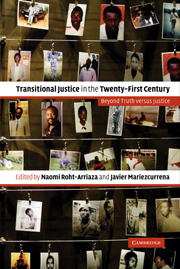Book contents
- Frontmatter
- Contents
- List of contributors
- Acknowledgments
- The new landscape of transitional justice
- Part I Truth, justice, and multiple institutions
- Introduction to Part I
- 1 The Sierra Leone Truth and Reconciliation Commission
- 2 Transitional criminal justice in Sierra Leone
- 3 The Peruvian Truth and Reconciliation Commission and the challenge of impunity
- 4 The “Mexican solution” to transitional justice
- 5 No justice, no peace: Discussion of a legal framework regarding the demobilization of non-state armed groups in Colombia
- 6 Hybrid attempts at accountability for serious crimes in Timor Leste
- Part II Levels of justice: Local, national and international
- Index
2 - Transitional criminal justice in Sierra Leone
Published online by Cambridge University Press: 05 June 2012
- Frontmatter
- Contents
- List of contributors
- Acknowledgments
- The new landscape of transitional justice
- Part I Truth, justice, and multiple institutions
- Introduction to Part I
- 1 The Sierra Leone Truth and Reconciliation Commission
- 2 Transitional criminal justice in Sierra Leone
- 3 The Peruvian Truth and Reconciliation Commission and the challenge of impunity
- 4 The “Mexican solution” to transitional justice
- 5 No justice, no peace: Discussion of a legal framework regarding the demobilization of non-state armed groups in Colombia
- 6 Hybrid attempts at accountability for serious crimes in Timor Leste
- Part II Levels of justice: Local, national and international
- Index
Summary
I believe that crimes of the magnitude committed in this country are of concern to all persons in the world, as they greatly diminish respect for international law and for the most basic human rights. It is my hope that the United Nations and the international community can assist the people of Sierra Leone in bringing to justice those responsible for those grave crimes.
Letter sent by the President of Sierra Leone, Ahmad Tejan Kabbah, to the UN Secretary-General, dated June 12, 2000.Receptive to Sierra Leone's cry for help, the United Nations concluded an agreement with the Government of Sierra Leone establishing the Special Court for Sierra Leone (Special Court), mandated to try persons bearing the greatest responsibility for international crimes and certain domestic crimes committed within the country since November 30, 1996. The Special Court is the first modern international criminal tribunal located within the country where the prosecuted crimes were committed. It is also the first such tribunal that was created by a bilateral treaty, coexisted with a truth and reconciliation commission, has a far-reaching outreach program, and relies mostly on national staff.
The Court's geographical location and the national institutional support it receives facilitate the collection of physical evidence and the preparation of witnesses, increasing the efficiency of its process. These factors also provide the Court with an excellent opportunity to engage in local capacity-building initiatives aimed at enhancing its ability to leave behind a legacy.
- Type
- Chapter
- Information
- Transitional Justice in the Twenty-First CenturyBeyond Truth versus Justice, pp. 43 - 69Publisher: Cambridge University PressPrint publication year: 2006
- 3
- Cited by

